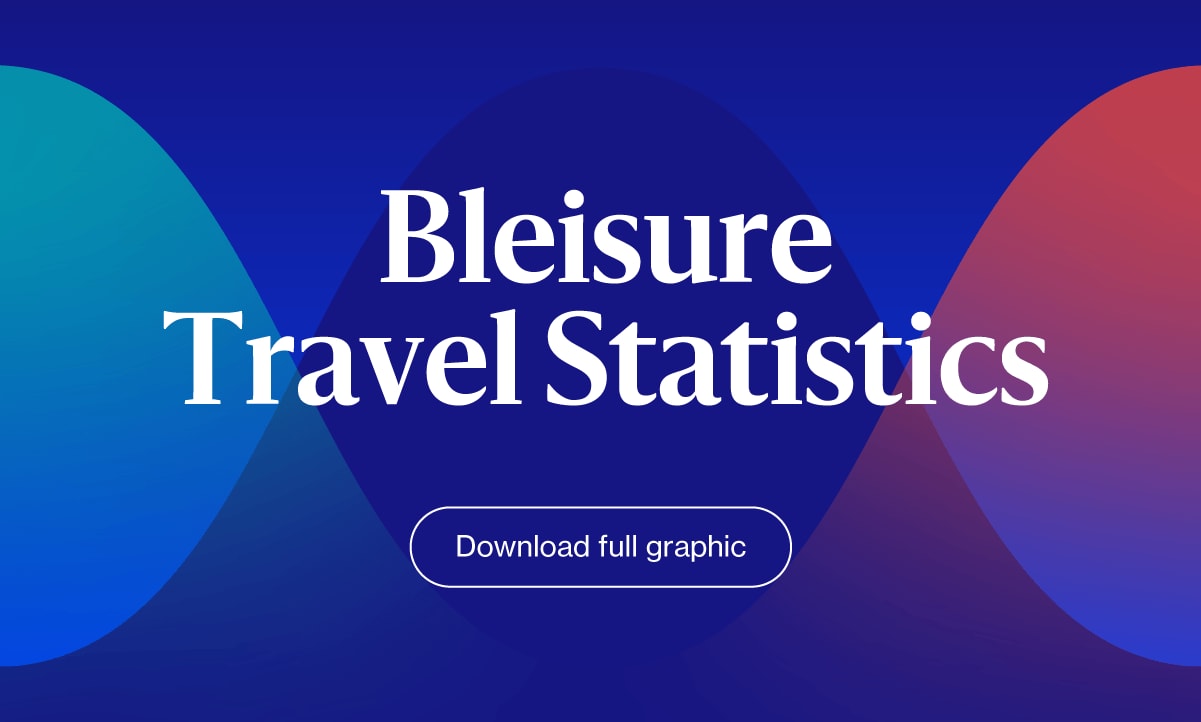Business, Leisure, and Blended Travel Explained

Travel patterns are shifting. Navan + Skift's latest report found that 54% of business travelers took at least two trips that blended business and leisure in 2024. Additionally, the pool of people traveling for work is also expanding, as more employees from more business departments across organizations hit the road and take to the skies.
What’s the difference between business and leisure travel? The line can often be blurry. Let’s explore the nuances and understand the benefits and drawbacks of combining both types of travel.
What Defines Business Travel?
Business travel includes trips taken for business or work purposes on behalf of an employer. Any travel for business purposes falls under this umbrella term, including but not limited to travel for events, conferences, company off-sites or on-sites, client meetings, trade fairs, office visits, or other business meetings.
What Defines Leisure Travel?
Leisure travel includes trips made for entertainment, recreation, relaxation, or personal enrichment. Leisure travelers might be going on getaways, sightseeing, or traveling for other personal reasons, such as visiting family or friends.
What Defines Blended Travel?
Blended travel is any type of travel that blends work and leisure time, including adding extra days to a business trip or working remotely from a different location. This type of travel has risen in popularity since the COVID-19 pandemic began thanks to the widespread adoption of remote and hybrid working formats.
Business + Leisure = Bleisure
76% of business travelers have added a leisure extension.
What Are The Different Types of Blended Travel?
There are several portmanteaus that the travel industry uses to define different types of blended travel:
- Bleisure: Describes the process of adding leisure or personal travel time to a scheduled business trip. For example, an employee travels to New York for a conference that ends on a Friday and extends the trip through the weekend.
- Bizcation/workcation: When employees conduct business from locations outside of their usual workplace. For example, an employee travels to a cabin in Alaska for non-work purposes and works remotely there.
Additionally, digital nomads are location independent and complete remote work rather than being physically present at a company office.
What Are The Benefits of Blended Travel?
Itineraries that combine business and leisure travel have several benefits for the employer and the traveler.
Benefits for the Employee
When an employee extends a business trip into a mini-vacation, they typically only have to pay for a hotel room or vacation rental during the leisure portion of the trip and save on air travel since that is taken care of by the employer. They can also rack up or take advantage of loyalty program points with their favorite travel suppliers.
The hospitality industry has also taken notice of the bleisure travel trend. Hoteliers and other travel providers are increasingly offering special deals and discounts to entice business travelers to stay longer.
There are also harder-to-quantify perks, such as the mental health benefits of taking a break and the creativity boost from experiencing new things and learning more about the world. A recent Global Business Travel Association survey found that 57% of business travelers admit to choosing work trips based on the destination—proof that business travelers prioritize their leisure time.
Benefits for the Employer
Many employers are catching on to the fact that there is no harm in allowing travelers who complete a successful business trip to tack on some leisure time. A growing number of employers are encouraging the practice as an employee benefit because it has been shown to improve company culture, increase productivity, combat burnout, and even lead to cost savings for companies. Some companies are even adding guidelines for leisure travel extensions into their corporate travel policies.
Evidence shows that traveling employees want to combine work and play, and allowing business travelers to add some leisure time to trips helps turn the work of a business trip into a job perk. Encouraging the practice can help fix the disconnect between a company’s time-off policies and its culture around using PTO, ultimately leading to better recruitment and retention.
What Are the Drawbacks of Blended Travel?
As more employees blend business and leisure trips, expense reports become more challenging to complete accurately. Companies that do not establish clear boundaries for personal and business expenses risk allowing receipts for personal expenses to get caught up in the mix.
Bring Clarity to Corporate Travel and Expenses
Navan is a travel and expense management company that can help bring the blurry line between work and play into focus. To reduce common travel risks like fraud, errors, and mistakes, an all-in-one corporate travel, cards, and expense management solution helps enforce travel policies at the point of purchase. For example, the expense will be automatically denied if an employee attempts to charge a coffee on a non-business travel day.
Additionally, Navan allows travelers to split payments between business and leisure trips. If a traveler wants to extend their hotel room through the weekend, they can put the cost on their personal card with a few clicks. Learn more about the benefits of booking personal travel on Navan.
Functionality like that can reduce rogue spending for the company and eliminate the need to track expenses and submit them for approval altogether.
Travelers around the world book business, personal, and bleisure travel with Navan for a trusted, quality experience. Schedule a demo.
This content is for informational purposes only. It doesn't necessarily reflect the views of Navan and should not be construed as legal, tax, benefits, financial, accounting, or other advice. If you need specific advice for your business, please consult with an expert, as rules and regulations change regularly.
More content you might like
Take Travel and Expense Further with Navan
Move faster, stay compliant, and save smarter.


